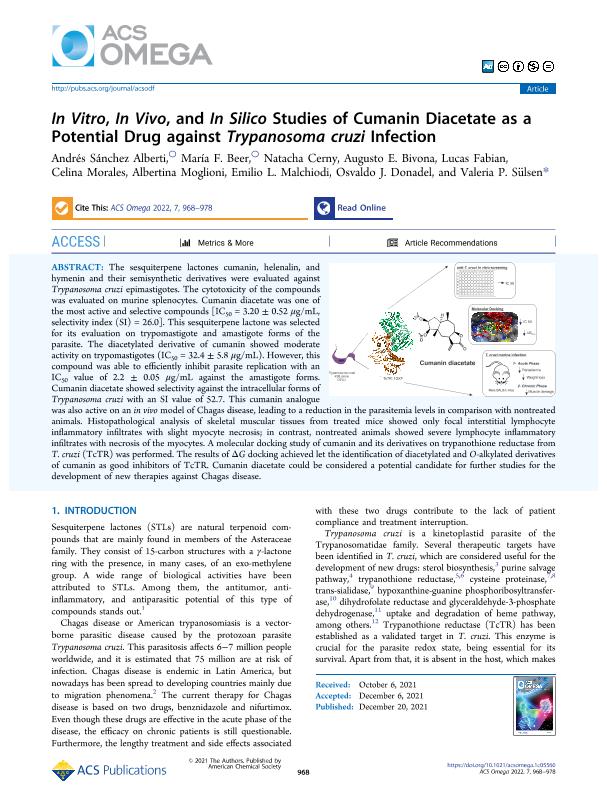Artículo
In Vitro, in Vivo, and in Silico Studies of Cumanin Diacetate as a Potential Drug against Trypanosoma cruzi Infection
Sanchez Alberti, Andrés ; Beer, Maria Florencia
; Beer, Maria Florencia ; Cerny, Natacha
; Cerny, Natacha ; Bivona, Augusto Ernesto
; Bivona, Augusto Ernesto ; Fabian, Lucas Emanuel
; Fabian, Lucas Emanuel ; Morales, Maria Celina; Moglioni, Albertina Gladys
; Morales, Maria Celina; Moglioni, Albertina Gladys ; Malchiodi, Emilio Luis
; Malchiodi, Emilio Luis ; Donadel, Osvaldo Juan; Sülsen, Valeria Patricia
; Donadel, Osvaldo Juan; Sülsen, Valeria Patricia
 ; Beer, Maria Florencia
; Beer, Maria Florencia ; Cerny, Natacha
; Cerny, Natacha ; Bivona, Augusto Ernesto
; Bivona, Augusto Ernesto ; Fabian, Lucas Emanuel
; Fabian, Lucas Emanuel ; Morales, Maria Celina; Moglioni, Albertina Gladys
; Morales, Maria Celina; Moglioni, Albertina Gladys ; Malchiodi, Emilio Luis
; Malchiodi, Emilio Luis ; Donadel, Osvaldo Juan; Sülsen, Valeria Patricia
; Donadel, Osvaldo Juan; Sülsen, Valeria Patricia
Fecha de publicación:
01/2022
Editorial:
American Chemical Society
Revista:
ACS Omega
e-ISSN:
2470-1343
Idioma:
Inglés
Tipo de recurso:
Artículo publicado
Clasificación temática:
Resumen
The sesquiterpene lactones cumanin, helenalin, and hymenin and their semisynthetic derivatives were evaluated against Trypanosoma cruzi epimastigotes. The cytotoxicity of the compounds was evaluated on murine splenocytes. Cumanin diacetate was one of the most active and selective compounds [IC50 = 3.20 ± 0.52 μg/mL, selectivity index (SI) = 26.0]. This sesquiterpene lactone was selected for its evaluation on trypomastigote and amastigote forms of the parasite. The diacetylated derivative of cumanin showed moderate activity on trypomastigotes (IC50 = 32.4 ± 5.8 μg/mL). However, this compound was able to efficiently inhibit parasite replication with an IC50 value of 2.2 ± 0.05 μg/mL against the amastigote forms. Cumanin diacetate showed selectivity against the intracellular forms of Trypanosoma cruzi with an SI value of 52.7. This cumanin analogue was also active on an in vivo model of Chagas disease, leading to a reduction in the parasitemia levels in comparison with nontreated animals. Histopathological analysis of skeletal muscular tissues from treated mice showed only focal interstitial lymphocyte inflammatory infiltrates with slight myocyte necrosis; in contrast, nontreated animals showed severe lymphocyte inflammatory infiltrates with necrosis of the myocytes. A molecular docking study of cumanin and its derivatives on trypanothione reductase from T. cruzi (TcTR) was performed. The results of δG docking achieved let the identification of diacetylated and O-alkylated derivatives of cumanin as good inhibitors of TcTR. Cumanin diacetate could be considered a potential candidate for further studies for the development of new therapies against Chagas disease.
Archivos asociados
Licencia
Identificadores
Colecciones
Articulos(IQUIMEFA)
Articulos de INST.QUIMICA Y METABOLISMO DEL FARMACO (I)
Articulos de INST.QUIMICA Y METABOLISMO DEL FARMACO (I)
Citación
Sanchez Alberti, Andrés; Beer, Maria Florencia; Cerny, Natacha; Bivona, Augusto Ernesto; Fabian, Lucas Emanuel; et al.; In Vitro, in Vivo, and in Silico Studies of Cumanin Diacetate as a Potential Drug against Trypanosoma cruzi Infection; American Chemical Society; ACS Omega; 7; 1; 1-2022; 968-978
Compartir
Altmétricas



